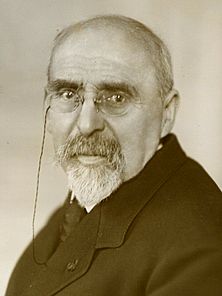Ferdinand Buisson facts for kids
Quick facts for kids
Ferdinand Édouard Buisson
|
|
|---|---|

Buisson in 1932
|
|
| Born | 20 December 1841 |
| Died | 16 February 1932 (aged 90) Thieuloy-Saint-Antoine, France
|
| Nationality | French |
| Occupation | politician |
| Known for | Nobel Peace Prize in 1927 |
Ferdinand Édouard Buisson (born December 20, 1841 – died February 16, 1932) was an important French educator, politician, and pacifist. He believed strongly in peace and fairness.
Buisson led the League of Education from 1902 to 1906. He also headed the Human Rights League from 1914 to 1926. In 1927, he won the Nobel Peace Prize along with Ludwig Quidde.
As an educator, he was the Director of Primary Education in France. He is famous for fighting for education that is not linked to any religion. He even helped create the idea of laïcité, which means "secularism" or keeping government and public institutions separate from religious influence.
Contents
About Ferdinand Buisson
Ferdinand Buisson studied at the Lycée Condorcet in Paris. He earned a high-level degree in philosophy.
He was a liberal Protestant, meaning he had a flexible view of his religion. From 1866 to 1870, he chose to live in Switzerland. This was during a time called the Second Empire in France, and he refused to support the government then.
Buisson's Work and Career
Buisson became a professor at what is now the University of Neuchâtel in Switzerland. He attended several international meetings for peace. At one meeting in Lausanne in 1869, he gave a speech about peace.
When France became a Republic again, he returned home. He worked actively in social and political projects in Paris. In 1870, he took charge of an orphanage. This was the first orphanage that was not run by a church.
He cared deeply about the children. He helped place them in another orphanage run by a kind person named Joseph Gabriel Prevost.
Leading Education in France
From 1879 to 1896, Ferdinand Buisson worked for Jules Ferry, who was the Minister of Public Instruction. Buisson was in charge of Primary Education.
In 1890, he became a professor of education at the Sorbonne. He helped write and design laws for secular education. In 1905, he led the group that wrote the law separating church and state in France. This law made sure the government and schools were neutral on religious matters.
Fighting for Human Rights
In 1898, Buisson supported Alfred Dreyfus, a Jewish army officer who was wrongly accused of treason. Buisson helped create the French League for Human Rights. He was its president from 1913 to 1926.
He was also a politician, serving as a deputy (like a member of parliament) for Paris from 1902 to 1914, and again from 1919 to 1924. He strongly supported vocational education, which teaches practical skills for jobs. He also believed women should have the right to vote.
Promoting Peace and Reconciliation
During World War I, Buisson was a patriot and supported his country. After the war, he worked hard for peace between France and Germany. He invited German pacifists (people who believe in peace) to Paris and traveled to Berlin himself.
Buisson was an early supporter of the League of Nations. This was an organization created after World War I to promote world peace.
The Education Dictionary
Ferdinand Buisson also led a huge project to create an important book called the Dictionnaire de pédagogie et d'instruction primaire. This was a dictionary about education. He worked with over 350 people to write it.
The first edition came out between 1882 and 1887. Buisson himself wrote many entries, including ones on "Secularism" and "Prayer." This dictionary became known as the "Bible" for the French public school system.
In 1927, Buisson received the Nobel Peace Prize with German professor Ludwig Quidde. This recognized his efforts for peace and understanding between nations.
Awards and Honors
- Prize Marcelin Guérin from the Académie Française, 1892
- Grand Officer of the Legion of honor, 1924
- Nobel Peace Prize, 1927
Images for kids
See also
 In Spanish: Ferdinand Buisson para niños
In Spanish: Ferdinand Buisson para niños


